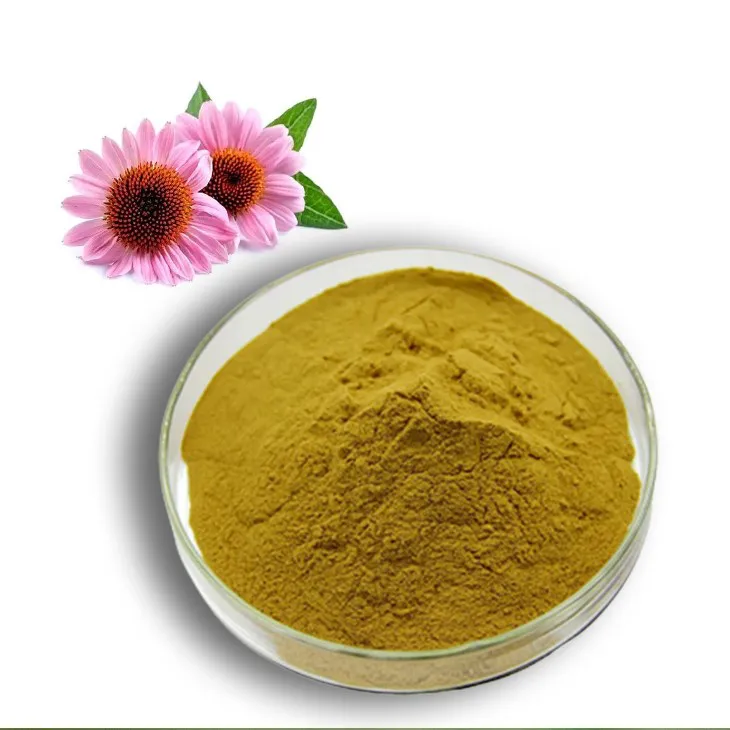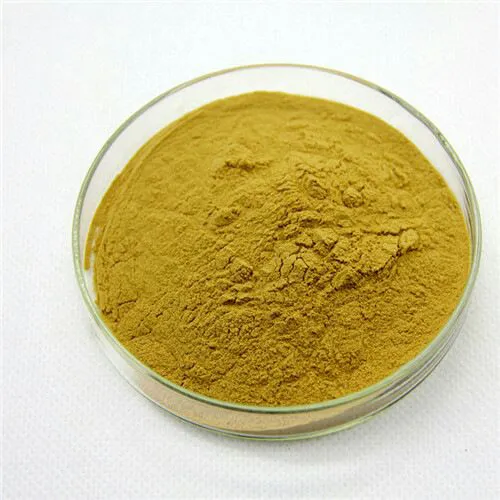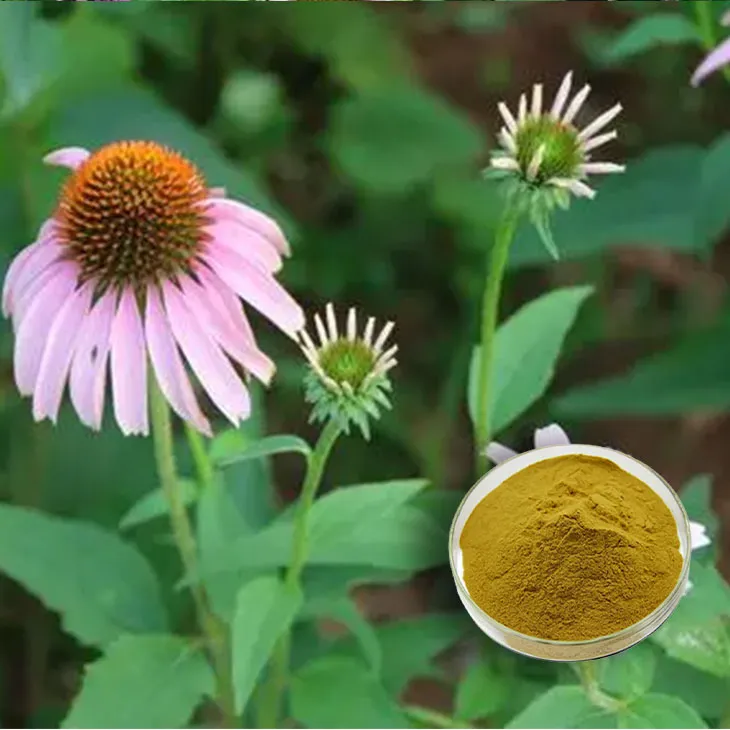- 0086-571-85302990
- sales@greenskybio.com
Echinacea Extract: The Herbal Product Trend You Should Know.
2024-12-20

Introduction
In recent years, the world of herbal remedies has witnessed a significant rise in the popularity of Echinacea Extract. This natural product has emerged as a prominent player in the field of alternative medicine, captivating the attention of health - conscious individuals across the globe. Its allure lies in the numerous health benefits that it is purported to possess.

The Chemical Components of Echinacea
Echinacea contains a complex array of chemical components that are believed to be responsible for its potential effects on health. One of the key groups of compounds are the alkamides. These are lipid - soluble substances that have been shown to have immunomodulatory properties. Alkamides may play a role in enhancing the body's immune response by interacting with certain receptors in the immune system.
Another important class of compounds in echinacea are the polysaccharides. These large, complex carbohydrates are thought to contribute to the plant's immune - boosting capabilities. They can stimulate the activity of immune cells such as macrophages, which are responsible for engulfing and destroying foreign invaders in the body.
Caffeic acid derivatives are also present in echinacea. These compounds have antioxidant properties, which means they can help protect the body's cells from damage caused by free radicals. Free radicals are unstable molecules that can cause oxidative stress, which is linked to a variety of health problems including aging, cancer, and heart disease.

Comparing Echinacea Extract with Other Immune - Boosting Products
When it comes to immune - boosting products, the market is flooded with a variety of options. Echinacea Extract stands out in several ways when compared to some of the more common alternatives.
Vitamin C Supplements
Vitamin C is a well - known immune - booster. It is essential for the proper function of the immune system as it is involved in the production of white blood cells. However, echinacea extract offers a more comprehensive approach to immune support. While vitamin C mainly focuses on enhancing the production of immune cells, echinacea can modulate the entire immune response, including enhancing the activity of immune cells already present in the body.
Zinc Supplements
Zinc is another popular supplement for immune health. It is required for the normal development and function of immune cells. However, zinc supplements can sometimes cause side effects such as nausea and vomiting if taken in excessive amounts. In contrast, echinacea extract is generally well - tolerated, with few reported side effects when used as directed.
Probiotic Supplements
Probiotics are beneficial bacteria that can support the immune system by maintaining a healthy gut microbiota. They work mainly in the gut - associated lymphoid tissue, which is an important part of the immune system. Echinacea extract, on the other hand, has a more systemic effect on the immune system, working throughout the body rather than just in the gut area.

Cultivation and Harvesting of Echinacea Plants
The quality of Echinacea extract is highly dependent on the cultivation and harvesting of the echinacea plants. These plants are native to North America and are typically grown in well - drained soil with plenty of sunlight.
Proper cultivation techniques are essential to ensure the plants are healthy and contain high levels of the active compounds. This includes providing the right amount of water, fertilizers, and protection from pests and diseases. Organic farming methods are often preferred for echinacea cultivation as they can result in a more pure and potent extract.
The timing of the harvest is also crucial. Echinacea plants are usually harvested when they are in their flowering stage. At this point, the plants are believed to have the highest concentration of the active compounds. Once harvested, the plants are carefully dried and processed to extract the beneficial compounds.

Benefits of Echinacea Extract
Echinacea extract has been associated with a number of potential health benefits.
- Immune System Support: As mentioned earlier, echinacea is believed to enhance the immune system. It can potentially reduce the severity and duration of colds and other respiratory infections. Some studies have shown that taking echinacea at the first sign of a cold can help shorten the illness.
- Anti - Inflammatory Properties: The compounds in echinacea, such as caffeic acid derivatives, may have anti - inflammatory effects. This can be beneficial for conditions such as arthritis, where inflammation in the joints can cause pain and reduced mobility.
- Antioxidant Activity: The antioxidant properties of echinacea can help protect the body from oxidative damage. This may contribute to overall health and well - being, and may also play a role in preventing chronic diseases such as cancer and heart disease.
How to Use Echinacea Extract
Echinacea extract is available in a variety of forms, including capsules, tablets, tinctures, and teas.
- Capsules and Tablets: These are the most convenient forms for many people. They typically contain a standardized amount of echinacea extract. The recommended dosage can vary depending on the product, but generally, it is advisable to follow the instructions on the label.
- Tinctures: Echinacea tinctures are made by soaking the plant material in alcohol or a glycerin - based solution. They can be taken directly under the tongue or added to water. Tinctures are often more concentrated than capsules or tablets, so a smaller dosage may be required.
- Teas: Echinacea tea can be made by steeping the dried plant material in hot water. It is a more natural and gentle way to consume echinacea. However, the concentration of the active compounds in tea may be lower compared to other forms.
Precautions and Side Effects
While echinacea extract is generally considered safe for most people, there are some precautions to be aware of.
- Allergic Reactions: Some individuals may be allergic to echinacea. Symptoms of an allergic reaction can include skin rashes, itching, and swelling. If you have a known allergy to plants in the daisy family, you should avoid echinacea.
- Interactions with Medications: Echinacea may interact with certain medications. For example, it may interfere with drugs that are metabolized by the liver, such as some anti - seizure medications. If you are taking any medications, it is important to consult your doctor before using echinacea extract.
- Duration of Use: It is not recommended to use echinacea extract for extended periods of time. Prolonged use may lead to a decrease in its effectiveness or potential side effects. A typical course of use is usually no more than 8 - 10 weeks.
Conclusion
In conclusion, Echinacea extract is a fascinating herbal product that has gained significant popularity in recent years. Its potential health benefits, combined with its relatively safe profile, make it an appealing option for those interested in natural remedies. However, it is important to use it responsibly and be aware of the precautions and potential side effects. By understanding the chemical components, comparing it with other immune - boosting products, and being informed about its cultivation, harvesting, and proper use, individuals can make more informed decisions about whether echinacea extract is right for them.
FAQ:
What are the main chemical components in echinacea extract?
The main chemical components in echinacea extract include alkamides, caffeic acid derivatives, polysaccharides, and glycoproteins. These components are thought to contribute to its potential health benefits, such as immune - boosting effects.
How does echinacea extract compare to other immune - boosting products?
Echinacea extract has its own unique set of chemical components. Compared to some synthetic immune - boosting products, it is a natural herbal alternative. However, the effectiveness may vary from person to person. Some other immune - boosting products might have more targeted effects, while echinacea extract is believed to work in a more holistic way to support the immune system. Also, different products may have different safety profiles and recommended dosages.
What are the best practices for cultivating echinacea plants to ensure high - quality extract?
For high - quality echinacea extract, proper cultivation is crucial. Echinacea plants prefer well - drained soil and full sun to partial shade. Adequate spacing between plants is necessary to prevent overcrowding and disease spread. They should be watered regularly but not over - watered. Harvesting at the right time is also important. Usually, the roots and aerial parts are harvested at different stages of growth. The harvested plants should be processed quickly to preserve the active components.
Are there any side effects associated with echinacea extract?
While echinacea extract is generally considered safe for most people, some individuals may experience side effects. These can include allergic reactions, especially in those who are allergic to other plants in the daisy family. It may also cause gastrointestinal discomfort such as nausea, stomachache, or diarrhea in some cases. Pregnant or breastfeeding women should consult a healthcare provider before using echinacea extract as its safety in these situations has not been fully established.
How is echinacea extract typically used?
Echinacea extract is available in various forms, such as capsules, tablets, tinctures, and teas. When using capsules or tablets, it is usually taken orally with water according to the recommended dosage. Tinctures are often diluted in water or another liquid before consumption. For echinacea tea, the dried herb or extract is steeped in hot water for a few minutes and then drunk. The frequency of use may vary depending on the intended purpose, but it is generally not recommended for long - term continuous use without consulting a healthcare professional.
Related literature
- Echinacea: A Source of Potent Immunomodulatory Compounds"
- "The Chemistry and Bioactivity of Echinacea Extracts: A Review"
- "Cultivation and Processing of Echinacea for Medicinal Use"
- ▶ Hesperidin
- ▶ Citrus Bioflavonoids
- ▶ Plant Extract
- ▶ lycopene
- ▶ Diosmin
- ▶ Grape seed extract
- ▶ Sea buckthorn Juice Powder
- ▶ Fruit Juice Powder
- ▶ Hops Extract
- ▶ Artichoke Extract
- ▶ Mushroom extract
- ▶ Astaxanthin
- ▶ Green Tea Extract
- ▶ Curcumin
- ▶ Horse Chestnut Extract
- ▶ Other Product
- ▶ Boswellia Serrata Extract
- ▶ Resveratrol
- ▶ Marigold Extract
- ▶ Grape Leaf Extract
- ▶ New Product
- ▶ Aminolevulinic acid
- ▶ Cranberry Extract
- ▶ Red Yeast Rice
- ▶ Red Wine Extract
-
Tongkat Ali Extract
2024-12-20
-
Giant Knotweed Extract
2024-12-20
-
Clove Powder
2024-12-20
-
Pueraria Lobata Extract
2024-12-20
-
Centella Asiatica Extract
2024-12-20
-
Dandelion Root Extract
2024-12-20
-
Horse Chestnut Extract
2024-12-20
-
Tamarind extract powder
2024-12-20
-
Yam Extract
2024-12-20
-
Oat Straw Extract Powder
2024-12-20





















